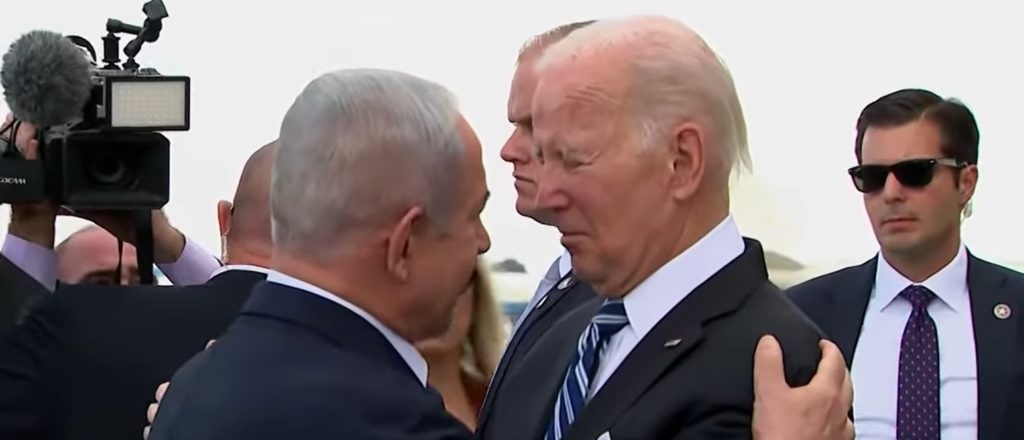President Joe Biden’s newest Gaza ceasefire plan could hand Hamas a much-needed window to rebuild its battered ranks and potentially launch another Oct. 7-style attack on Israel, defense experts and former U.S. officials told the Daily Caller News Foundation.
Israel, the U.S. and international negotiators have been working for months to strike a deal with Hamas for a temporary ceasefire in exchange for the release of hostages in the terrorist group’s captivity and the delivery of aid to Gaza. On Friday, Biden presented what he claimed to be a new Israeli proposal for a permanent ceasefire in Gaza, rather than a temporary one, as part of a three-phase plan to fully end the ongoing Israel-Hamas war.
“Israel has offered a comprehensive new proposal,” Biden told reporters on Friday. “It’s a roadmap to an enduring ceasefire and the release of all hostages.”
This is a decisive moment.
Now is the time to raise your voices and demand that Hamas comes to the table, agrees to this deal, and ends this war that they began. pic.twitter.com/ugWZYmaWuJ
— President Biden (@POTUS) May 31, 2024
But a permanent ceasefire at this stage of the war could allow Hamas, which has not been fully defeated and retains forces throughout Gaza, to regroup, return and eventually stage an attack against Israel, similar to the Oct. 7 attacks in which Hamas terrorists killed 1,200 people, experts told the DCNF.
“If this war ends now and Israeli forces withdraw, let’s say within six weeks or two months, then the nucleus of Hamas’ presence remains, and that is going to allow the group to rearm — and they’re not just rearming on their own,” David Daoud, senior fellow on Middle Eastern affairs the Foundation for Defense of Democracies, told the DCNF. “They have allies in the region, from Iran to Hezbollah, that are going to help them rearm and regroup. And what we’re going to end up with is a situation where, you know, five, definitely, 10 years, Hamas might be ready to commit another Oct. 7.”
“This only perpetuates the cycle of violence as Hamas regroups and attacks again,” Victoria Coates, Heritage Foundation executive and former White House national security advisor, told the DCNF. “The only way there could be an end to all military operations in Gaza right now is if Hamas lays down their arms.”
Israel has now offered a roadmap to an enduring ceasefire – and the release of all the hostages.
Yesterday, this proposal was transmitted by Qatar to Hamas.
Today, I want to lay out its terms for the world. pic.twitter.com/0cdypBP9wb
— President Biden (@POTUS) May 31, 2024
It is difficult to determine the exact number of casualties Hamas has sustained since it started its war against Israel on Oct. 7. Hamas was estimated to have roughly 30,000 fighters located throughout Gaza before that date; eight months into fighting, the IDF has killed more than 14,000 fighters, according to Israeli Prime Minister Benjamin Netanyahu’s most recent estimate.
A bulk of the fighters are believed to be located in Rafah, the southernmost region of Gaza and the last large-scale theater for a conflict between the IDF and Hamas. Hamas and hundreds of thousands of Palestinians have fled into Rafah after the IDF seized control of the northern and southern regions.
The Biden administration and the international community have pressured Israel not to launch a full ground assault in Rafah, citing the disproportional impact it could have on civilians. Additionally, the Biden administration believes that Israel has crippled Hamas enough to a point where massive military operations are no longer needed, a position Biden reiterated on Friday.
“At this point, Hamas no longer is capable of carrying out another Oct. 7,” Biden told reporters on Friday. “I know there are those in Israel who will not agree with this plan and will call for the war to continue indefinitely. Some — some are even in the government coalition… Well, I’ve urged the leadership in Israel to stand behind this deal, despite whatever pressure comes.”
Even with the damage Hamas has suffered, experts warned that too many fighters remain to ensure that the terrorist group could never stage another “Oct. 7,” in Biden’s words. Aside from the Hamas battalions that remain in Rafah, fighters have resurged in northern and central Gaza and attacked IDF forces who took control of those regions.
“Biden is focused on this idea that Hamas doesn’t have to be destroyed, that it needs to merely be degraded into that carried out another Oct. 7 style attack, and that’s good enough. I think that’s preposterous,” Gabriel Noronha, executive director of Polaris National Security and former State Department official, told the DCNF. ” It’s consistent with what policy, which is this obsession with preventing the destruction of our enemies. So that’s what he’s trying to do.”
Noronha compared Biden’s proposed end to the war to his approach to Afghanistan, in which he claimed that “al-Qaeda would not” come back to the region after U.S. troops withdrew in 2021. Yet, Al-Qaida has since returned to Afghanistan and has established several military training camps and safe houses, maintaining a close relationship with the Taliban for protection.
“Just like in Afghanistan, Biden is trying to do a timeline, political-based end to the war, to sequester involvement in the war, and not a conditions-based end,” Noronha told the DCNF. “It’s a copy-paste into a new battlefield and environment with the same principles.”
There’s also confusion over whether the plan Biden presented on Friday was fully an Israeli proposal, as he claimed it was. Netanyahu’s office said on Friday and Saturday that the “actual” proposal that Israel had presented would allow for a permanent ceasefire only after the “destruction” of Hamas.
Netanyahu said until that condition is met, a ceasefire is a “non-starter.”
“Biden should be releasing a plan that supports our ally Israel’s objective of completely destroying Hamas, but his administration unmistakably has sought to undermine it,” Michael Bars, former White House senior communications advisor and National Security Council official, told the DCNF. “Israel has continually maintained that it won’t let terrorists off the hook in Gaza, but the proposal appears to be yet another public pressure point to achieve an outcome closer to that.”
It isn’t clear why Biden’s and Netanyahu’s proposals differed, but some experts mused that Biden could have been interpreting the deal in a way that favored a permanent ceasefire, which a large portion of his voting bloc has demanded he call for.
The Biden reelection campaign has been working to shore up support from Muslim communities and groups who have become increasingly frustrated with his handling of the conflict, especially in battleground states like Michigan, which has a high Arab population. Only 26% of voters approve of Biden’s performance in the Israel-Hamas war as of May, compared to 60% who disapproved, according to a Yahoo/YouGov poll from May 10.
“Is this a good proposal, no. The kind of deal where Hamas accepts Israel’s existence, and commits to never violate its sovereignty again, and follows through with that? Anyone who thinks that’s going to happen is living in a very alternate version of reality,” Daoud said. “Hamas is ideologically committed to Israel’s destruction. There is no possibility that, as long as Hamas exists, a permanent ceasefire between Israel and Gaza will ever exist.”
The White House National Security Council did not immediately respond to a request for comment.
All content created by the Daily Caller News Foundation, an independent and nonpartisan newswire service, is available without charge to any legitimate news publisher that can provide a large audience. All republished articles must include our logo, our reporter’s byline and their DCNF affiliation. For any questions about our guidelines or partnering with us, please contact [email protected].















